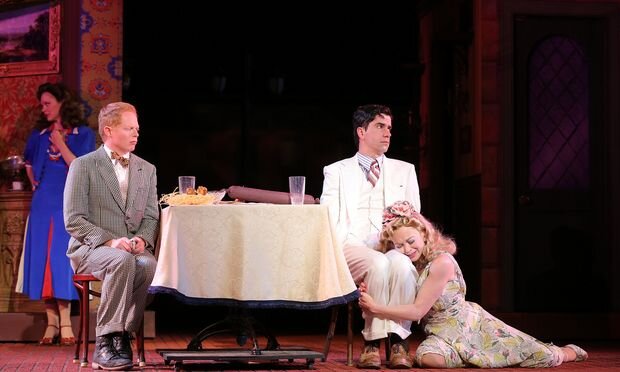The Comedy of Errors
It’s hard to be outraged when laughing this hard. But the delightfully entertaining production of The Comedy of Errors, currently playing as part of Shakespeare in the Park at the Delacorte Theater, offers just that complicated combination: a thoroughly humorous show that also provides a glance at some darker and frustrating themes in Shakespeare’s work.
Directed by Daniel Sullivan, Shakespeare’s farce of mistaken identity is set in 1940s upstate New York, starring Hamish Linklater and Jesse Tyler Ferguson as the two sets of long-lost twins. The show opens with the Duke (Skip Sudduth) threatening Egeon (Jonathan Hadary), a merchant from Syracuse, with death as punishment for setting foot in Ephesus. Egeon’s son Antipholus of Syracuse (Linklater) arrives in search of his twin, who was separated from him at birth, with his attendant Dromio (Ferguson), who was also separated from his own twin at birth. The two are instantly and frequently mistaken with their lookalikes and much hilarity and mischief ensues.
These antics include Antipholus’ wife Adriana (Emily Bergl), mistaking her husband’s twin for her spouse, who she suspects of being unfaithful to her. It doesn’t help matters when he falls for her sister, Luciana (Heidi Schreck). Or that the local courtesan De’Adre Aziza, (who sings a vibrant rendition of “Sigh No More,” from Much Ado About Nothing) is also entangled with the married Antipholus and out to make a profit on potential blackmail.Naturally, a series of madcap escapades follow, including, but not limited to nuns toting guns, spaghetti being dumped on someone’s head and imprisonment in a straight jacket. All of this is swiftly executed, with great comedic timing, especially by Ferguson, a Shakespeare in the Park veteran who is a truly talented performer. His two Dromios, differentiated by subtle physical distinctions, are both truly hilarious. And Linklater, also a frequent contributor to the summer series, is equally capable as Antipholus, especially in the lengthy speech he gives at the end of the show, summarizing the trials and tribulations his character has faced as a result of the mistaken identities.
All of this is beautifully staged, with vibrant, period-perfect swing dancing, choreographed by Mimi Lieber, in brightly colorful costumes by Toni-Leslie James and equally lovely sets by John Lee Beatty.So why the outrage I mentioned before? Simple; The Comedy of Errors does not exactly portray a flattering depiction of women’s logic. Instead, they are portrayed as subservient, emotionally unstable and completely dependent upon men for both their physical and mental well-being.
Bergl and Schreck are both skilled actors and share a natural rapport onstage; my frustration with their characters has nothing to do with their performances. It merely has to do with the way their characters were written.Take this response from Luciana to her sister, when she frets as to why her husband is late: “Man is master of his liberty; time is their master, and when they see time, they’ll go or come. If so, be patient, sister.” Adriana asks, “Why should their liberty than ours be more?” and her sister responds, “Because their business still lies out o' door.” So because a man provides money for his family, he is entitled to come and go as he pleases, while his wife waits uneasily at home for him?
Adriana actually experiences worries and discomfort at her husband’s absence and questions the idea that a man should have more liberty than women, and later is portrayed as mentally unstable, giving a hysterical, over-the-top speech about her husband cheating on her.In a contrasting depiction, when Luciana confronts who she thinks is her brother in law about his suspected infidelity, she tells him to cheat if he must, but to pretend he loves his wife. Neither of these women present a happy portrait of women at that time.
The audience is only offered glimpses of Antipholus’ violent nature; beating his servant and constantly referring to his wife as “harlot” and a “strumpet” and referring to women as “witches.” Another disturbing aspect of the play was the portrayal of Nell, the kitchen maid engaged to one of the two Dromios. Constant comments are made about her weight, even calling her a “mountain of mad flesh.” And of all the humorous aspects of The Comedy of Errors, these were the ones that earned the most laughter from the audience. This didn't feel funny to me; it felt cruel. And it felt disrespectful to the production; with such a skilled cast and such a beautifully executed show, why are fat jokes earning the most laughs?
Despite my frustration with The Comedy of Errors, I thought it was the best kind of production Shakespeare in the Park could offer — thoroughly entertaining and also stimulating and thought-provoking. I only hope the charm of the comedy and dancing under the stars of Central Park did not cause the audience to completely lose sight of the more somber aspects of the show.

